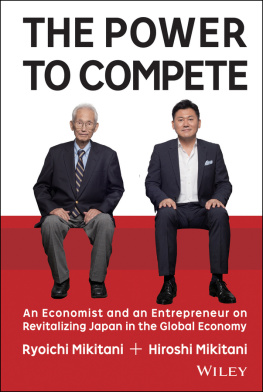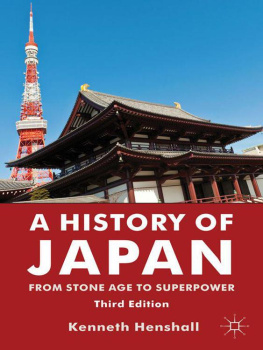
Cover image: Hiroshi Noguchi
Cover design: Seiichi Suzuki
Copyright 2014 by Hiroshi Mikitani. All rights reserved.
Published by John Wiley & Sons, Inc., Hoboken, New Jersey.
Published simultaneously in Canada.
No part of this publication may be reproduced, stored in a retrieval system, or transmitted in any form or by any means, electronic, mechanical, photocopying, recording, scanning, or otherwise, except as permitted under Section 107 or 108 of the 1976 United States Copyright Act, without either the prior written permission of the Publisher, or authorization through payment of the appropriate per-copy fee to the Copyright Clearance Center, 222 Rosewood Drive, Danvers, MA 01923, (978) 750-8400, fax (978) 646-8600, or on the web at www.copyright.com. Requests to the Publisher for permission should be addressed to the Permissions Department, John Wiley & Sons, Inc., 111 River Street, Hoboken, NJ 07030, (201) 748-6011, fax (201) 748-6008, or online at www.wiley.com/go/permissions.
Limit of Liability/Disclaimer of Warranty: While the publisher and author have used their best efforts in preparing this book, they make no representations or warranties with the respect to the accuracy or completeness of the contents of this book and specifically disclaim any implied warranties of merchantability or fitness for a particular purpose. No warranty may be created or extended by sales representatives or written sales materials. The advice and strategies contained herein may not be suitable for your situation. You should consult with a professional where appropriate. Neither the publisher nor the author shall be liable for damages arising herefrom.
For general information about our other products and services, please contact our Customer Care Department within the United States at (800) 762-2974, outside the United States at (317) 572-3993 or fax (317) 572-4002.
Wiley publishes in a variety of print and electronic formats and by print-on-demand. Some material included with standard print versions of this book may not be included in e-books or in print-on-demand. If this book refers to media such as a CD or DVD that is not included in the version you purchased, you may download this material at http://booksupport.wiley.com. For more information about Wiley products, visit www.wiley.com.
ISBN 978-1-119-00060-0 (cloth);
ISBN 978-1-119-00114-0 (ebk);
ISBN 978-1-119-00115-7 (ebk)
Introduction
Japan Again
We are in a worldwide period of tremendous change, driven by the global information technology (IT) revolution. But not all of Japan has embraced the transformation. The sad truth is that few Japanese political, business, or governmental leaders understand where we are and where we are going. In many important ways, Japan today is the same as it was in the Edo period, when our country was closed off to the world and the leaders of the shogunate paid no mind to the changes happening abroad.
Even though we are seeing massive global changes in the IT industry, Japan as a whole seems unable to participate in the process. We drift aimlessly. The IT revolution has created structural shifts that are bringing the world together as if it were one continent. And yet, in Japan, people continue to prefer conventional frameworks, believing that we should enjoy a separate, isolated kind of Galapagos island. People here do not even try to consider the current global reality. This is as true for cell phones as it is for corporate governance and international accounting standards. I believe that the old guard's refusal to allow society to change only results in lowered productivity and weaker competitiveness for Japan.
Nowhere is this problem more obvious than in our government bureaucracy, which has become so bloated and rigid that it should really be called state capitalism. The continuation of the bureaucracy-led economy can only create a situation in which innovation is stifled; it will not inspire economic growth. And as the Japanese economy decelerates, the national debt continues to swell. It is difficult to imagine that this country has a future if we maintain the current spiral of loss in which the public is forced to swallow tax increases just so the government can somehow get by.
Japan is a country of rich traditions, culture, and philosophies cultivated over a 2,000-year history. We also excel in advanced technology and creativity. We need to share this intellectual and technical wealth. We must not limit our ambitions to our own small national borders and become a country of exclusion. Japan should instead become a country of greater openness, one that accepts a variety of people and cultures, and is attractive to people everywhere. This calls for two intertwined goals: (1) We must work to become the wealthiest country in the world; and (2) we must also strive to become a safe and peaceful country with highly advanced science, technology, and culture.
My work with the Japan Association of New Economy is aimed at achieving those goals. First, we must eliminate anachronistic regulations. At the same time, we must develop innovative businesses and services through the use of the Internet and other IT, and connect that innovation to the economic growth of Japan.
The second Abe As a member of the Industrial Competitiveness Council, I have had the opportunity to debate a growth strategy, the third arrow of Abenomics. I combined my thoughts as a business leader on that debate into a proposal entitled Japan Again.
While working on these issues of government and growth strategies, it occurred to me that I wanted to write a book about the topic. And I knew early on whom I would ask to be my coauthor: my father. My dad, an economist and a professor emeritus at Kobe University, had often been my debate partner and sounding board as I explored issues around the Japanese economy. He passed away in late 2013, but before that happened, we engaged in a series of discussions about the future of Japan and the global economy. The result of those debates is this book. My father was instrumental in helping me to understand where we are now, what has led us to this place, and what we must do going forward for Japan and for the larger global economy. It is my honor to share that thinking with you here, in the hopes of continuing the important global conversation he and I started.
Allow me to take a moment to introduce my dad: Ryoichi Mikitani was born at the start of the global economic crisis of 1929 in Nada-ku, Kobe. After graduating from the Graduate School of Economics at Kobe University, then called Kobe University of Economics, he chose the path of researcher, and from 1972 until his compulsory retirement as a public employee in 1993, he was a professor in the Graduate School of Economics at Kobe University. He specialized in financial theory and U.S. economic theory, and he served as president of the Japan Society of Monetary Economics. From there, he moved to the faculty of economics in the Graduate School of Economics at Kobe Gakuin University. He retired in 2002.
My dad was an international economist, which is a rare occupation in Japan. He studied at a language school in his teens, and he was fluent in both English and German. He easily passed the test for the Fulbright Scholar Program, which is known to be a difficult trial, and in 1959, at the age of 29, he entered the Graduate School of Arts and Sciences of Harvard University in the United States. There he studied U.S. economics, then a cutting-edge subject, and he also grew close with James Duesenberry, who was famous for his work on the demonstration effect, as well as Paul Sweezy, known as a Keynesian economist who was well versed in Marxian economics. At the same time, my dad immersed himself in tomes such as the Chinese military text
Next page










